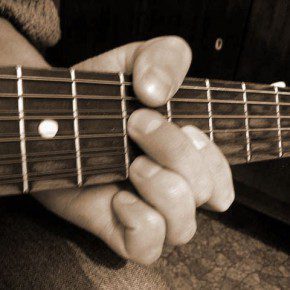On the music of words and poetry of sounds: reflections
When musicologists said that “philosophical reflections sound” or “psychological depth of sound,” at first it was not clear to me what they were talking about. How is it – music and suddenly philosophy? Or, moreover, psychology, and even “deep”.
And listening, for example, to songs performed by Yuri Vizbor, who invites you to “fill your hearts with music,” I understand him perfectly. And when he performs “My Darling” or “When My Beloved Came into My House” to the sounds of his own guitar, honestly, I want to cry. For myself, for my, as it seems to me, aimless life, for unfinished deeds, for unsung and unheard songs.
It is impossible to love all music, as well as all women! Therefore, I will talk about “selective” love for some music. I’ll talk from my point of view, from the height of the hummock that I was able to climb. And she is not as tall as the climber Yuri Vizbor liked. My height is just a hummock in a swamp.
And you do as you please: you can read and compare your perceptions with the author’s, or put this reading aside and do something else.
So, at first I didn’t understand the professional musicologists who were watching from their bell tower. They know better. I just feel the sound of many melodies and songs in my soul.
Of course, I love listening to more than just Vizbor, but also Vysotsky, especially his “a little slower, horses…”, our pop singers Lev Leshchenko and Joseph Kobzon, I really like to listen to the early songs of Alla Pugacheva, her famous “Crossing”, “In the Seventh Row” “, “Harlequin”, “A Million Scarlet Roses”. I love soulful, lyrical songs performed by Lyudmila Tolkunova. Romances performed by the famous Hvorostovsky. Crazy about the song “Shores” performed by Malinin.
For some reason, it seems to me that it was the written words that gave birth to the music. And not vice versa. And it turned out to be the music of words. Now, in the modern stage, there are neither words nor music. Just guttural cries and stupid words repeated in an endless refrain.
But we’re not just talking about old pop songs that most people born in the middle of the last century love. I would like to express my perception of a mere mortal also about “great music,” as it is commonly called, “classical.”
There is a complete dispersion of interests here and it is impossible to restore order and somehow systematize, sort into shelves. And there’s no point! And I’m not going to “bring order” to the dispersion of opinions. I’ll tell you how I perceive this or that sounding thing, these or those words put into music.
I love Imre Kalman’s bravura. Especially his “Circus Princess” and “Princess of Czardas”. And at the same time, I’m crazy about the lyrical music of Richard Strauss’s “Tales from the Vienna Woods.”
At the beginning of my conversation, I was surprised how “philosophy” could sound in music. And now I will say that while listening to “Tales of the Vienna Woods”, I actually feel the smell of pine needles and coolness, the rustling of leaves, the chimes of birds. And rustling, and smells, and colors – it turns out that everything can be present in music!
Have you ever listened to Antonio Vivaldi’s violin concertos? Be sure to listen and try to recognize in the sounds both a snowy winter, and awakening nature in the spring, and a sultry summer, and an early warm autumn. You will definitely recognize them, you just have to listen.
Who doesn’t know Anna Akhmatova’s poems! Composer Sergei Prokofiev wrote romances for some of her poems. He fell in love with the poetess’s poems “The sun filled the room”, “True tenderness cannot be confused”, “Hello” and as a result immortal romances appeared. Everyone can see for themselves how music fills a room with sunshine. You see, there is another magic in music – sun glare!
Since I started talking about romances, I remembered another masterpiece given to generations by composer Alexander Alyabyev. This romance is called “The Nightingale”. The composer wrote it under unusual conditions while in prison. He was accused of beating a landowner, who soon died.
Such paradoxes happen in the lives of the great: participation in the war with the French in 1812, the high society of the capital cities of Russia and Europe, music, a circle of close writers… and prison. The longing for freedom and the nightingale – a symbol of freedom – filled the composer’s soul, and he could not help but pour out his masterpiece, frozen for centuries in wonderful music.
How can one not admire Mikhail Ivanovich Glinka’s romances “I Remember a Wonderful Moment”, “The Fire of Desire Burns in the Blood”! Or enjoy the masterpieces of Italian opera performed by Caruso!
And when Oginsky’s polonaise “Farewell to the Motherland” sounds, a lump comes to the throat. One friend said that she would write in her will that she would be buried to the sounds of this inhuman music. Such things – great, sad, and funny – are nearby.
Sometimes a person is having fun – then the song of the Duke of Rigoletto by composer Giuseppe Verdi will suit the mood, remember: “The heart of a beauty is prone to betrayal…”.
Every man to his own taste. Some people like modern “pop” songs rumbling with drums and cymbals, and others like ancient romances and waltzes of the last century, which make you think about existence, about life. And these masterpieces were written when the people were suffering from famine in the thirties, when Stalin’s broom destroyed the entire flower of the Soviet people.
Again the paradox of life and creativity. It is in the most difficult years of his life that a person produces masterpieces, such as the composer Alyabyev, the writer Dostoevsky, and the poetess Anna Akhmatova.
Now let me put an end to the chaotic thoughts about the music that the people of my generation love.





